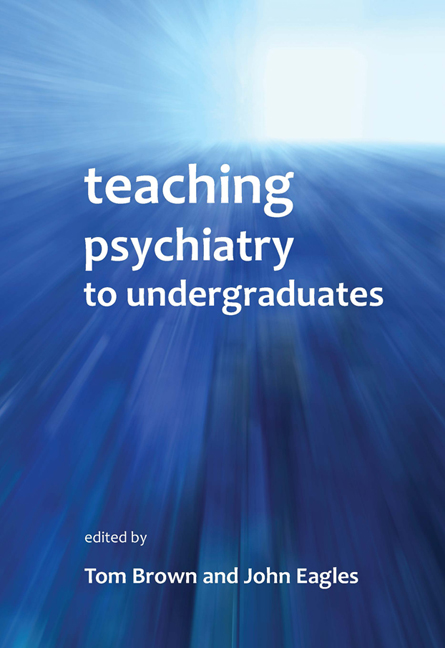Book contents
- Frontmatter
- Contents
- List of figures, tables and boxes
- List of contributors
- Preface
- Foreword
- 1 How do students learn?
- 2 Recent developments in undergraduate medical education
- 3 Undergraduate psychiatry teaching – the core curriculum
- 4 The organisation of undergraduate teaching
- 5 Assessment of undergraduates in psychiatry
- 6 Using computers to teach undergraduate psychiatry
- 7 How to give a lecture
- 8 How to do small-group teaching
- 9 Problem-based learning
- 10 Teaching trainee psychiatrists how to teach medical students: the Southampton model
- 11 Involving trainees in teaching
- 12 Involvement of service users in psychiatric education
- 13 Time-efficient clinical teaching
- 14 Intercalated degrees
- 15 Undergraduate experiences of psychiatry: a student view
- 16 Integration: teaching psychiatry with other specialties
- 17 Teaching the teachers in a cross-cultural setting: the Scotland–Malawi Mental Health Education Project
- 18 International undergraduate teaching
- 19 Teaching with simulated patients and role-play
- 20 Undergraduate medical education and recruitment to psychiatry
- 21 Choosing psychiatry: factors influencing career choice among foundation doctors in Scotland
- 22 Funding of the teaching of medical undergraduates
- 23 Dealing with students in difficulty
- 24 Training medical students to promote good mental health in secondary schools
- 25 Women in medicine
- Index
20 - Undergraduate medical education and recruitment to psychiatry
- Frontmatter
- Contents
- List of figures, tables and boxes
- List of contributors
- Preface
- Foreword
- 1 How do students learn?
- 2 Recent developments in undergraduate medical education
- 3 Undergraduate psychiatry teaching – the core curriculum
- 4 The organisation of undergraduate teaching
- 5 Assessment of undergraduates in psychiatry
- 6 Using computers to teach undergraduate psychiatry
- 7 How to give a lecture
- 8 How to do small-group teaching
- 9 Problem-based learning
- 10 Teaching trainee psychiatrists how to teach medical students: the Southampton model
- 11 Involving trainees in teaching
- 12 Involvement of service users in psychiatric education
- 13 Time-efficient clinical teaching
- 14 Intercalated degrees
- 15 Undergraduate experiences of psychiatry: a student view
- 16 Integration: teaching psychiatry with other specialties
- 17 Teaching the teachers in a cross-cultural setting: the Scotland–Malawi Mental Health Education Project
- 18 International undergraduate teaching
- 19 Teaching with simulated patients and role-play
- 20 Undergraduate medical education and recruitment to psychiatry
- 21 Choosing psychiatry: factors influencing career choice among foundation doctors in Scotland
- 22 Funding of the teaching of medical undergraduates
- 23 Dealing with students in difficulty
- 24 Training medical students to promote good mental health in secondary schools
- 25 Women in medicine
- Index
Summary
Introduction
For some time now, both in the UK and elsewhere, concern has been expressed over the recruitment and retention of psychiatrists (Pidd, 2003). The Royal College of Psychiatrists’ annual census over many years has demonstrated consultant vacancies of 10–15%. Goldacre et al (2005), in a substantial national survey of career choice, found that 4–5% of doctors graduating in the UK from 1974 to 2000 chose psychiatry as a career. This is not enough to meet workforce demands. Changes in the methods and content of undergraduate teaching and indeed in the demography of the medical student population (more females) have had no effect on this. In a survey of Scottish psychiatrists, Brown et al (2007) highlighted that a positive undergraduate experience was in the top five factors that consultants rated as being important in attracting them to psychiatry. Moreover, when asked what should be done to improve recruitment, improving undergraduate teaching was seen to be crucial. Similarly, Goldacre et al (2005) highlighted that undergraduate experience of teaching influences career choice. A number of studies have looked at various aspects of the undergraduate experience in relation to career choice; in this chapter we summarise these and draw some conclusions of possible relevance to those engaged in the important task of teaching medical students.
Selection of medical students
Brockington & Mumford (2002) highlighted the fact that psychiatry's recruitment problems may even start with factors influencing the selection of medical students, in that selection procedures favour applicants with a background in biological sciences rather than social sciences. They further note that a number of studies suggest that those with humanities or social science backgrounds are overrepresented in psychiatry training programmes (e.g. Donnan, 1976). This bias may be reinforced by the biological bias of medical education. Brockington & Mumford quote a US study (Silverman et al, 1983) which demonstrated that Boston medical students failed to recognise and attend to the relevance of psychosocial factors in the assessment of patients with chest pain and abdominal pain.
Pidd (2003) suggests the targeting of medical students ‘with positive attitudes to psychological approaches’.
- Type
- Chapter
- Information
- Teaching Psychiatry to Undergraduates , pp. 245 - 254Publisher: Royal College of PsychiatristsPrint publication year: 2011



